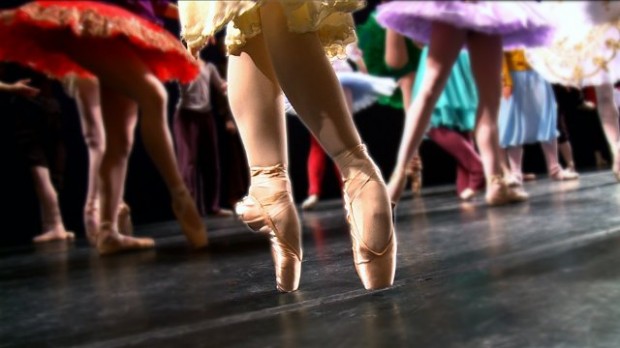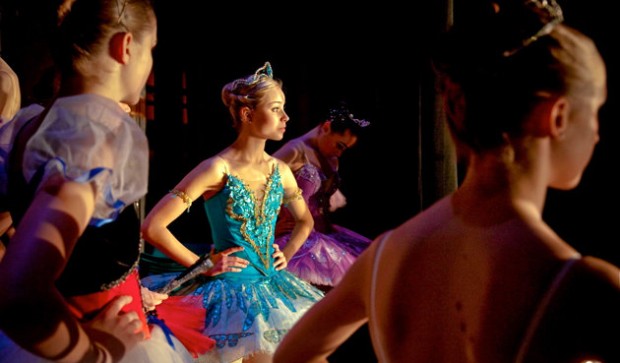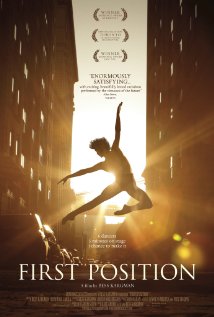First Position wants you to understand that ballet is no joke. As much as you might think the silly shoes and fluffy dress are signs that the environment is relaxed and easy, it’s not. There is beauty and grace, but behind that is repetition that leaves the body beaten and bruised. And it’s not repetition for a few weeks that culminates in a grand competition. It is the honing of the body every day, for hours on end, for months and even years. Now imagine that for adolescents, set in the modern world where prestigious international competitions like the Youth America Grand Prix can decide the future of these wunderkind. Full scholarships to the most vaunted ballet schools around the world are given out, and it is one step closer to launching a career in something that takes a level of dedication that would seem obsessive if it weren’t for the love within.

Eleven-year-old Aran has moved all over the world but has settled in Naples, Italy with his military family to focus on his dancing. Rebecca, a senior in high school, has attempted to pursue other things but finds her focus continually returning to ballet as she attempts to land a paid position with a ballet group in an increasingly competitive industry with fewer and fewer opportunities. Miko—twelve years old—and Jules—ten years old—both live under the same roof but find differing levels of passion for ballet and try to balance what they give up in their pursuits. Joan wants to follow in the footsteps of other famous male ballet dancers and show that a sixteen-year-old from Colombia, living in New York to follow his dream away from his family, can find a company that will allow him to excel. Finally there is Michaela, a fourteen-year-old orphan adopted out of Sierra Leone who dreams of defying the odds and showing the world that grace can be found in unexpected places.
Director Bess Kargman makes her feature debut with First Position but she manages to overcome most first-time mistakes for filmmakers. What could have turned into a devolving mess of competitors in the same age and gender is turned into an elegant expose on the different backgrounds and situations the dancers come from. Kargman is setting out to show that not every male dancer is gay, that ballerinas definitely eat food—and lots of it, and that this is hard work. She succeeds in all of those goals without expressly addressing them. She smartly avoids following dancers of the same age and gender, which balances the film as we see the younger children go through being a kid while the older ones balance the hopes and dreams of a ticking clock of opportunity.

There is no antagonist in the documentary. There aren’t any fights. That seems fitting when you consider a ballet competition like this is you versus oneself. Sometimes the drama comes from a debilitating recurring injury that nearly keeps one girl off her feet, while other times it is a battle of nerves. A routine often repeated without flaw can suddenly take a turn if you make a mistake and fall. Yet, again and again, we see that the key is perseverance and confidence. As an audience we are unlikely to ever experience performing in an adolescent state in front of the gatekeepers to our future dreams and desires in such a highly competitive environment. However, that is the reality for these six competitors and Kargman—with her own background in ballet—manages to find true talents that are on the cusp of breaking out in a very big way.
One does not have to appreciate ballet initially to enjoy First Position. The drama and drive can be transposed to numerous walks of life. If you are like me, you may also discover the beauty and flow that the individual performances highlight. That fact that these are such wonderful children—likely because of how disciplined ballet is—helps you root them on. Instead of showing snippets of performances, we see full numbers while learning about each one of these characters. They also live on an island in a cinematic sense. Save for the brother and sister, you don’t see the six interact. That reflects the size and scope of the final competition and serves as a reminder that each one of these dancers has a story to tell, some more outlandish than the others. Although these are just children, their performances will excite and inspire you and may leave you wanting for more. Perhaps one day you will see them on a stage near you. For now, First Position does the trick.
First Position hits limited release on Friday, May 4th.

